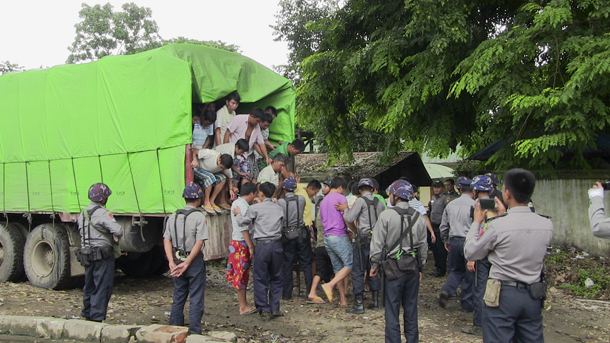RANGOON — Chinese officials have made their displeasure known over the long sentences leveled against 155 of that country’s citizens for illegal logging in Kachin State.
Amidst a large police presence at the Myitkyina District Court on Wednesday, 153 Chinese migrant workers were given life sentences for illegal logging in Kachin State forests, a punishment far harsher than observers had expected. Two other workers, both under the age of 18, were also sentenced to 10 years in jail each.
“These Chinese loggers were tricked by unlawful people, from both the Myanmar and Chinese sides, to enter and illegally log in Myanmar,” said Pan Xuesong, a spokesman for the Chinese Embassy. “They are now serving their jail time in poor conditions. We think even 20 years is too heavy a sentence to carry.”
Pan’s comments joined a chorus of condemnation from Beijing on Thursday, including editorials in state-run media and a statement by Foreign Ministry spokesman Lu Kang.
“We are highly concerned about the ruling made by the Myanmar side, and have lodged representations with it,” Lu said, in a statement published on the ministry’s website on Thursday. “We ask the Myanmar side to take China’s concerns seriously, take all the factors into account and properly handle this case.”
All 155 Chinese citizens involved in the case were charged under Section 6(a) of the Public Property Protection Act and anti-drug laws. Burma’s Ministry of Environmental Conservation and Forestry said earlier that the Chinese smugglers, who were arrested in January, carried out illegal logging activities for several years and should face a substantial penalty.
“We need to protect our environment, so this sentence is fair,” said Myint Swe, a Myitkyina District Court judge who sat on the case.
More than 4,500 tons of timber logs were seized on the logging site and handed over to the ministry in Myitkyina, according to the court. An excavator, three trailers, over 400 trucks, four Mitsubishi four wheel drives, cranes and bicycles were also seized by the military.
It is still unclear weather the Chinese loggers will appeal their sentences. In previous cases, Chinese nationals arrested for involvement in Burma’s illegal timber trade would routinely face jail terms of between one and five years, in addition to deportation.
The defendants, who previously claimed that the Kachin Independence Army had granted them permission to log in the area, all pleaded not guilty and denied any involvement in illegal logging, conceding only that they had entered the country illegally to find work.
No evidence or independent witnesses were presented to the court during the trials. Each defendant was given less than 15 minutes to be heard by the presiding judge.
The wife of one of the arrested Chinese loggers, Li Zhi Gang, said her husband is a truck driver and was working in the country for the first time.
“He did not participate in any illegal activities before, but nobody believed me,” she said. “He only went there this time to see if he could make a better living to support our children.”
According to the police investigation and sources familiar with the case, many of the defendants were farmers from Houqiao village in Yunnan province. They were able to earn 7,000 yuan (US$1,127) per month in the timber trade, around 10 times higher than what they were earning in China.
Sentencing was due to be delivered on July 17, but was postponed by the court pending further investigations. However, no further investigation was conducted, despite police being provided a list naming 23 Chinese logging traders, an official from the Kachin State Police Force told the Irrawaddy.
On Jan. 24, soon after the Chinese nationals were arrested, 23 Chinese traders submitted a letter to Chinese officials in Tengchong, asking for help to rescue the detained men and claiming that all those arrested had been provided “legitimate travel documents” issued by the Kachin Independence Army, permitting them to work in the area.
A top Kachin Independence Organization (KIO) official, who asked not to be named, said that local authorities, including border guard forces and officials from the forestry and immigration departments, were also complicit in bribe-taking, despite the fact that logging in the area was prohibited by the Union government.
“The government blamed the KIO, they don’t blame the local administrators…the border ministries, border security forces, customs, police, immigration,” he said. “Without the permission of these ministries, departments and staff, the Chinese men could not have entered Burma’s territory to begin with.”
Meanwhile, insiders said, illegal timber extraction continues unabated in Kachin State and the Wa Special Region, also on the Chinese border.
A Kachin State timber factory owner alleged that loggers had been instructed by the Department of Forestry to only transport illegal timber after dark, between 7-9pm.
Another source, who is familiar with the timber business in Wa Special Region said some Chinese loggers had also been arrested in Wa but were soon bailed out because of the close relationship between the United Wa State Army and the Burma Armed Forces.
“The illegal logging is still going on,” he said.
China is the world’s largest importer of timber, and about 90 percent of its timber imports are smuggled from Burma, according to the Myanmar Forestry Association.

















